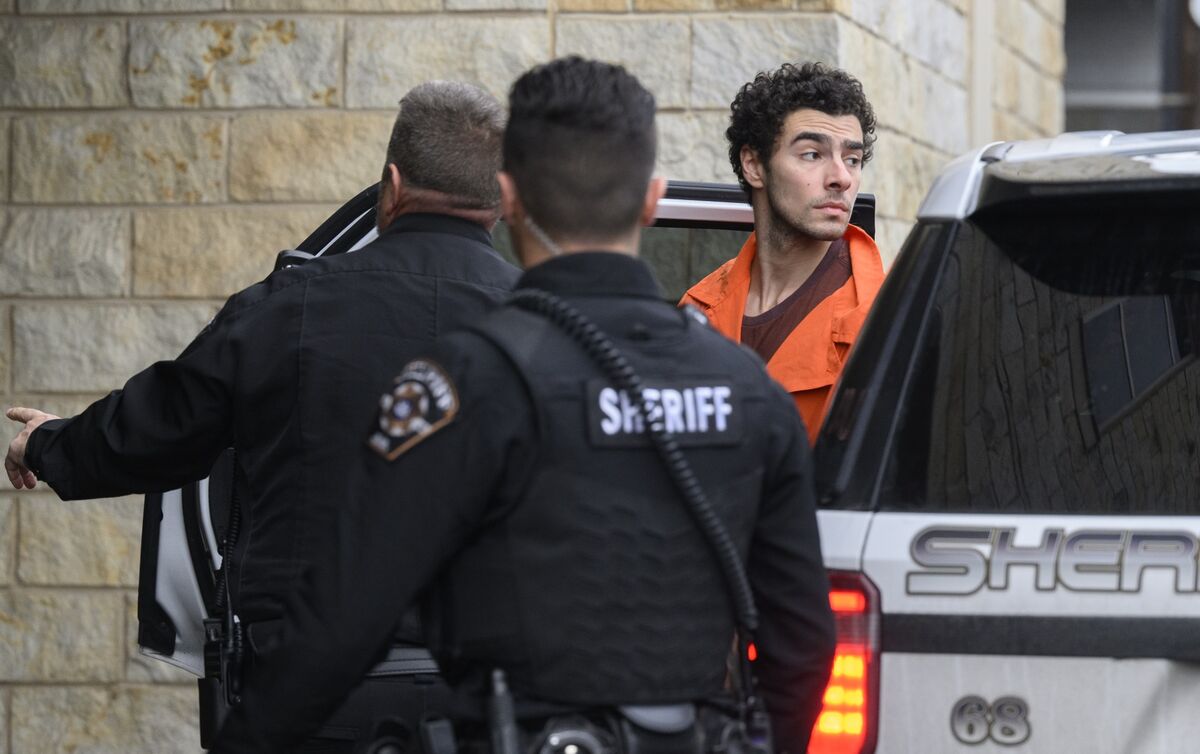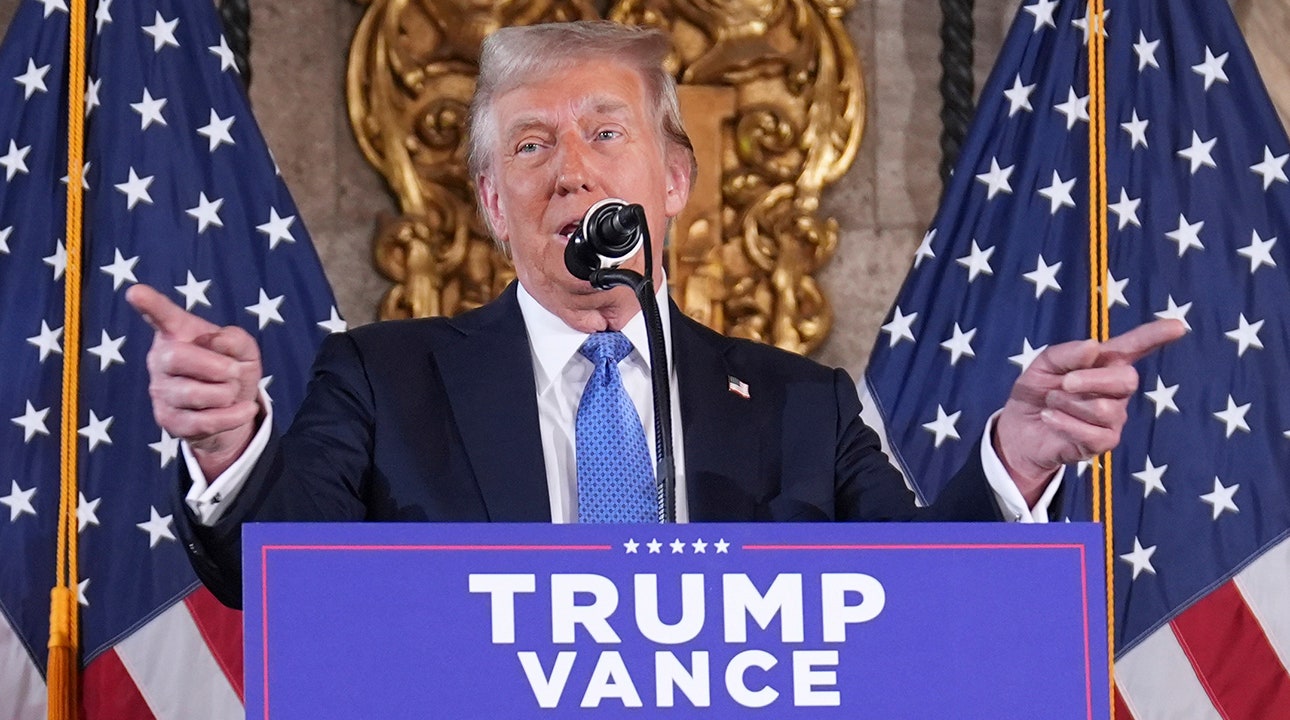World
Hollywood’s labor stoppage is over, but a painful industry-wide transition isn’t
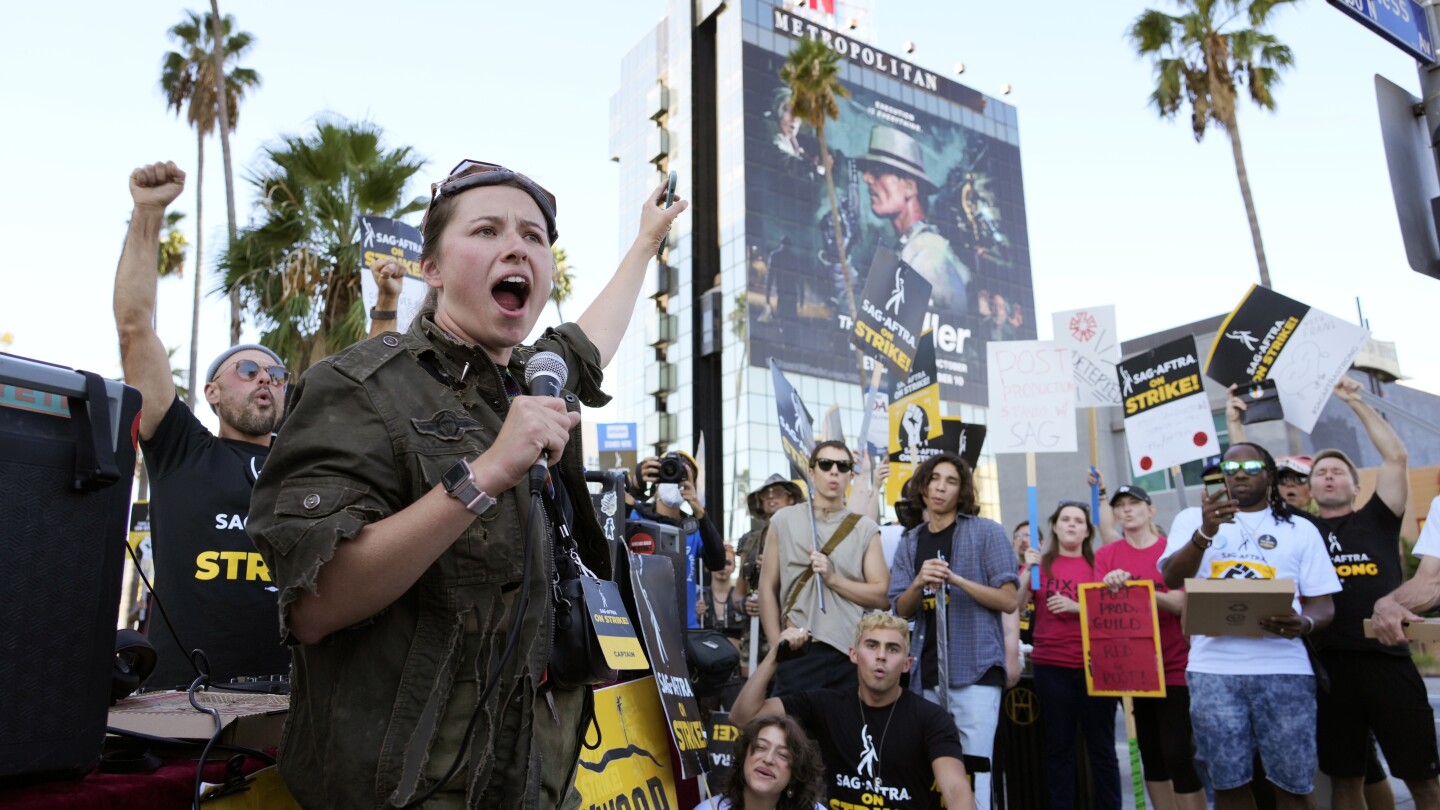
NEW YORK (AP) — Hollywood’s months of labor unrest are coming to an end, but the post-strike landscape that awaits actors and writers may be far from happy-ever-after.
The film and television industry could rightly celebrate the conclusion Wednesday of a bruising, protracted work stoppage that began in May when the Writers Guild hit the picket lines and gathered more force when Screen Actors Guild-American Federation of Television and Radio Artists members walked out in mid-July.
SAG-AFTRA captain Mary M. Flynn outside Netflix studios, Wednesday, Nov. 8, 2023, in Los Angeles. (AP Photo/Chris Pizzello)
The strikes were historic in their length and cost, causing an estimated $6 billion in economic loss and leaving hundreds of thousands out of work. As Hollywood on Thursday began rushing back to production and stars again hit red carpets, many were surely still nursing wounds from a bitter feud with the studios, even after a deal that won actors a hefty boost to minimum pay and protections over the use of artificial intelligence.
SAG-AFTRA’s board was to vote on approving the contract Friday afternoon.
But as actors swap their picket signs for audition sides and calls sheets, they’ll be returning to an industry still in the midst of painful transformation and streaming upheaval.
The strikes were prompted largely by the streaming wars, a digital land-rush to populate platforms like Disney+ and HBO Max (now just “Max”) with enough content to rival Netflix. That helter-skelter transition threw much of the economics of entertainment out of whack. One of the most contentious issues of SAG-AFTRA’s negotiations with the studios was the union’s attempt to win a percentage – 1 or 2% — of streaming revenue, to replace lost residuals. In the end, the actors accepted a bonus tied to viewership.
(AP Photo/Chris Pizzello)
But even before the strike, every studio was reexamining its streaming strategy. After several years of rampant green lights, most are pulling back, looking to make fewer series and movies, cutting staff and desperately seeking a path toward profitability. Wall Street, no longer enamored of subscriber numbers, wants to see profit, too.
The aftermath of the strike may look less like a party and more like a streaming hangover.
“The streaming business is completely screwed up. There’s too much content and nobody seems to be able to make any profit from it,” says Jonathan Taplin, director emeritus of the USC Annenberg Innovation Lab and author of “The End of Reality: How Four Billionaires are Selling a Fantasy Future of the Metaverse, Mars, and Crypto.”
Both strikes, Taplin says, were successful because the guilds gained bulwarks against potential decimation by artificial intelligence. But the road ahead, during which he expects linear television to collapse and some streaming services to go out of business, will be strained.
“The whole business is in a complete uproar,” says Taplin. “It will sort itself out in the next three to five years, but it’s going to be painful.”
(AP Photo/Chris Pizzello)
This is the world that awaits actors as they rush back to sets: Better pay but fewer jobs and intense competition. Puck’s Matt Belloni wrote: “What should be a time of relief and celebration in Hollywood is more akin to what soldiers experience in countless war movies — the horrors of battle give way to the equally grim reality of the new world for which they fought.”
Still, the strikes recalibrated power in Hollywood, winning gains for actors and writers and rallying union support throughout the industry. More battles loom. The contract for International Alliance of Theatrical Stage Employees (IATSE), which represents crew members, expires at the end of July.
Meanwhile, for months studios have signaled they’re downsizing. Earlier this week, Walt Disney Co. CEO Bob Iger in an earnings call where he touted the financial benefits of more than 8,000 job cuts, said the company is focused on consolidating: “Make less, focus more on quality.”
“At the time the pandemic hit, we were leaning into a huge increase in how much we were making,” Iger said. “And I’ve always felt that quantity can be actually a negative when it comes to quality. And I think that’s exactly what happened. We lost some focus.”
Netflix, which earlier set its sights on a new original movie every week, has said it’s now aiming for about half that. Hulu, which Disney plans to bundle with Disney+ after acquiring Comcast’s stake, is slimming down. Peacock lost $2.8 billion this year, Comcast has said; it announced layoffs to its marketing department Thursday.
Warner Bros. Discovery chief executive David Zaslav has taken drastic steps to get Max in order while the studio post-merger carries $43 billion in debt.
“This is a generational disruption we’re going through,” Zaslav said Wednesday. “Going through that with a streaming service that’s losing billions of dollars is really, really difficult to go on offense.”
Cancellations have grown more commonplace as streamers get more selective. Due in part to the strikes, series production will dip for the first time in years in 2023 after reaching an all-time high last year, when 599 original series were made. Peak TV, some say , is over.
But there are still huge amounts of money being thrown around. Apple Studios, for one, is behind two of the fall’s biggest budget films in Martin Scorsese’s “Killers of the Flower Moon” and Ridley Scott’s “Napoleon.”
SAG-AFTRA chief negotiator Duncan Crabtree-Ireland, rallies striking actors in outside Paramount Pictures studio, Friday, Nov. 3, 2023, in Los Angeles. (AP Photo/Chris Pizzello)
Duncan Crabtree-Ireland, SAG-AFTRA’s lead negotiator, remains optimistic about what’s ahead.
“I recognize that during a strike, sometimes rhetoric gets heated. People sometimes say things with the intention of sort of generating a reaction,” Duncan Crabtree-Ireland said Wednesday. “And so I think really we will see over the coming days, weeks and months what the industry’s real intentions are. But my expectation is that they do really want to get people back to work and that they’ll do so.”
___
Associated Press writer Krysta Fauria contributed to this report from Los Angeles.

World
Map: 7.3-Magnitude Earthquake Strikes Near Vanuatu
Note: Map shows the area with a shake intensity of 4 or greater, which U.S.G.S. defines as “light,” though the earthquake may be felt outside the areas shown. The New York Times
A major, 7.3-magnitude earthquake struck in the Coral Sea on Tuesday, according to the United States Geological Survey.
The quake briefly prompted a tsunami alert for parts of Vanuatu, according to the U.S. Tsunami Warning System, which is part of the National Weather Service. As of 2:14 p.m. local time, U.S. officials said the threat had passed.
The temblor happened at 12:47 p.m. Vanuatu time about 19 miles west of Port-Vila, Vanuatu, data from the agency shows.
U.S.G.S. data earlier reported that the magnitude was 7.4.
As seismologists review available data, they may revise the earthquake’s reported magnitude. Additional information collected about the earthquake may also prompt U.S.G.S. scientists to update the shake-severity map.
Aftershocks in the region
An aftershock is usually a smaller earthquake that follows a larger one in the same general area. Aftershocks are typically minor adjustments along the portion of a fault that slipped at the time of the initial earthquake.
Quakes and aftershocks within 100 miles
Aftershocks can occur days, weeks or even years after the first earthquake. These events can be of equal or larger magnitude to the initial earthquake, and they can continue to affect already damaged locations.
Source: United States Geological Survey | Notes: Shaking categories are based on the Modified Mercalli Intensity scale. When aftershock data is available, the corresponding maps and charts include earthquakes within 100 miles and seven days of the initial quake. All times above are Vanuatu time. Shake data is as of Monday, Dec. 16 at 9:01 p.m. Eastern. Aftershocks data is as of Tuesday, Dec. 17 at 9:02 a.m. Eastern.
World
Report exposes Hamas terrorist crimes against families during Oct 7 massacre: 'kinocide'
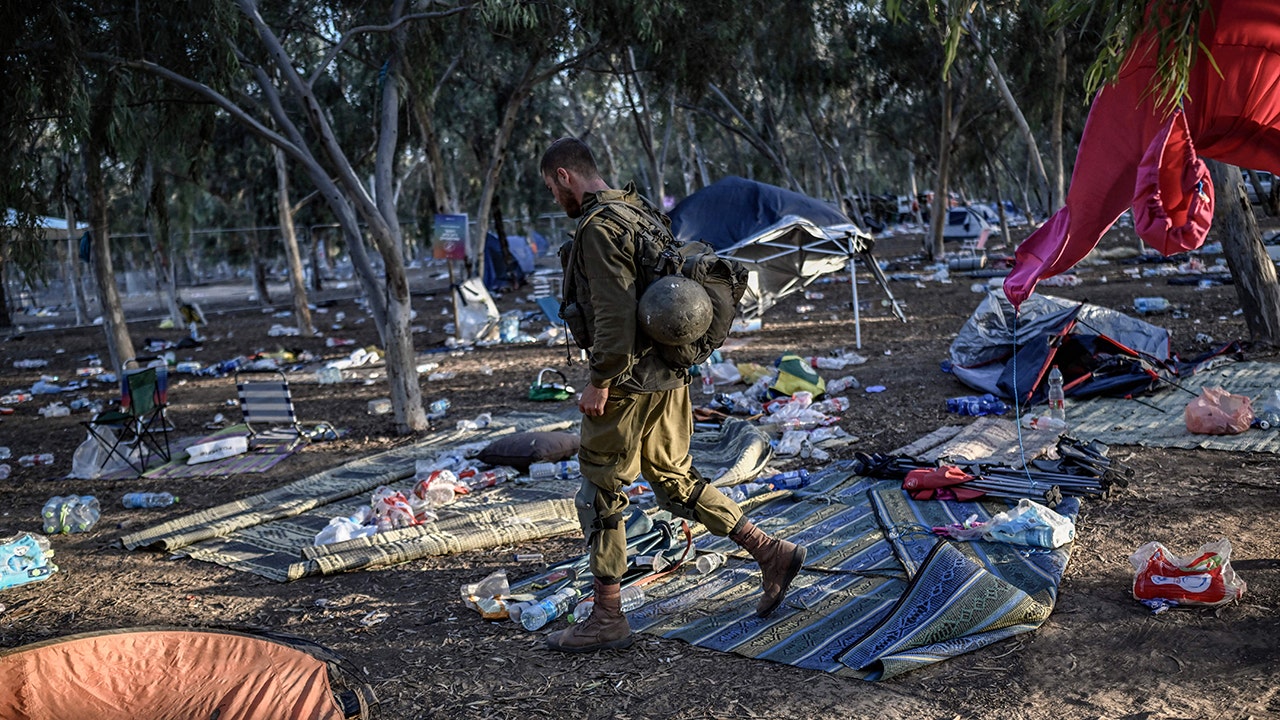
In the early hours of October 7, 2023, the Idan family of Kibbutz Nahal Oz was shattered when Hamas terrorists infiltrated their home. As the family tried to take refuge in their safe room, the terrorists murdered their eldest daughter, Maayan, in front of her parents and siblings, and then abducted the father, Tzachi. The scene was broadcast live on social media, forcing the nation to witness their agonizing last moments.
At the same time, in Kibbutz Holit, 16-year-old Rotem Matias lay hiding under his mother’s lifeless body, texting his sisters the heartbreaking news: “Mom and Dad are dead. Sorry.”
In Kfar Aza, Roee Idan was killed while holding his 3-year-old daughter, Abigail, as his older children watched in horror. Their mother, Smadar, was also shot before their eyes. Afterward, the children hid in a closet, trapped with their mother’s body, unsure of their younger sister’s fate, who was later abducted into Gaza.
ISRAELI POLICE SAY EXTREME SEXUAL VIOLENCE, RAPE BY HAMAS TERRORISTS WAS SYSTEMATIC
A bloodied handprint stains a wall in a Nir Oz house after Hamas terrorists attacked this kibbutz days earlier near the border of Gaza. (Alexi J. Rosenfeld/Getty Images)
These are just a few of the countless stories documented in a new report released on Tuesday, co-authored by Dr. Cochav Elkayam-Levy, founder of the Civil Commission on October 7th Crimes Against Women and Children, and Dr. Michal Gilad and Dr. Ilya Rudyak. The report introduces the term “kinocide” to describe the systematic targeting and destruction of family units during the attack- an unprecedented atrocity that goes beyond typical warfare.
“A crime without a name for victims without a voice,” as Dr. Elkayam-Levy described it. “The perpetrators not only killed but deliberately sought to destroy the very foundation of human society: the family.”
“The hardest crimes to witness were those involving families,” Dr. Elkayam-Levy continued, “While the Hamas perpetrators celebrated their violence, chanting religious slogans and broadcasting their actions on social media, the terror was not confined to the immediate victims-it was amplified globally.”
“The use of social media was crucial in spreading the terror, inspiring similar acts of violence elsewhere,” Merav Israeli-Amarant, CEO of the Civil Commission, told Fox News Digital. She referred to this tactic as the “terror theater” a term coined by legal scholar Tehila Schwartz Altshuler, explaining how the broadcasts were designed to radicalize and incite other terrorists.

Israeli soldiers remove the bodies of civilians who were killed days earlier in an attack by Palestinian terrorists on this kibbutz near the border with Gaza, on Oct. 10, 2023 in Kfar Aza, Israel. (Photo by Amir Levy/Getty Images)
As Elkayam-Levy and her team dug deeper, they realized that similar tactics have been documented in conflicts across the globe, from Argentina and Iraq to Syria, Sierra Leone and Myanmar. “We’ve been in contact with survivors of kinocide, including Yazidis, who have shared their experiences. The pain is universal. This has happened before, but it never had a name,” Dr. Elkayam-Levy said.
In collaboration with the Raoul Wallenberg Center for Human Rights, the commission worked to identify these patterns of abuse and ensure that kinocide is recognized as a distinct crime. The new report, released after a year of research, includes interviews with survivors, visits to the sites where the atrocities took place, and an extensive review of evidence. The goal is to bring kinocide into international legal discourse, advocating for its urgent need to be recognized as a distinct crime.
‘I WILL BE HAUNTED FOREVER’: ISRAEL’S HORRIFIC VIDEO OF HAMAS ATROCITIES LEAVES VIEWERS SHOCKED AND SICKENED

A woman breaks down at the memorial to Yulia Waxer Daunov as family members and friends of the lost and kidnapped gather at the site of the Nova Festival to mark the one-year anniversary of the attacks by Hamas terrorists on Oct. 7, 2024 in Re’im, Israel. (Leon Neal/Getty Images)
Professor Irwin Cotler, former Minister of Justice of Canada and International Chair of the Raoul Wallenberg Center for Human Rights, stated, “Silence in the face of such evil is not neutrality; it is complicity. Worse still, there has been denial, justification, and even the glorification of these heinous acts, underscoring the moral and legal imperative to act decisively against such crimes. The dangers of antisemitism are not just the oldest and most lethal of hatreds- they are also a presage of global evil, as evidenced by the events of October 7.”
“We need an international coalition to address this systematic targeting of families,” Elkayam-Levy said. “But international law has failed the survivors of October 7. The current legal frameworks do not adequately protect families in these kinds of attacks.”
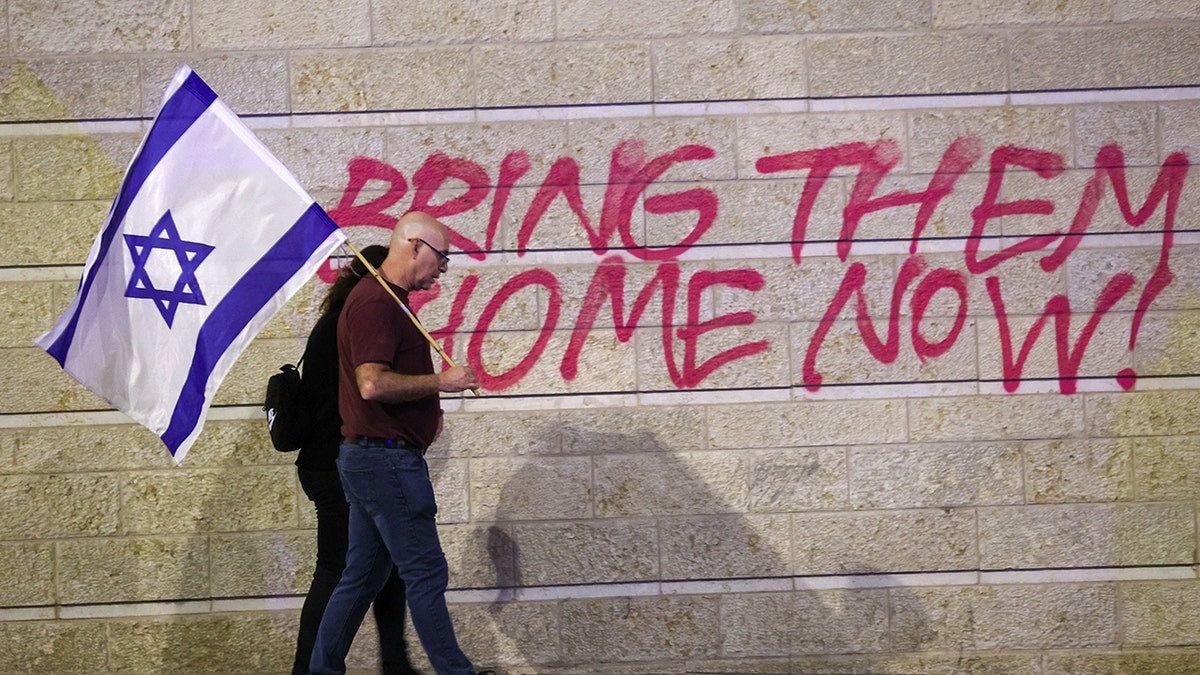
An Israeli couple holding their national flag walk in front of graffiti calling for the release of Israeli hostages held in the Gaza Strip since the Oct. 7 attack by Hamas terrorists in southern Israel, in Jerusalem on Nov. 18, 2023. (GIL COHEN-MAGEN/AFP via Getty Images)
The report, which has been endorsed by international law experts and human rights activists worldwide, highlights the urgent need for legal and social recognition of kinocide. However, despite the report’s widespread endorsement, Elkayam-Levy expressed her concern over the international community’s response.
As someone who faced the denial of prominent figures in the international human rights community in response to her last report on sexual violence on Oct. 7, she said, “We live in dark times when international law is weaponized against us (Israelis) in terrifying ways. As an international human rights scholar, I never imagined that we would live in a time when such abuse is directed at us. It really scares me.”
World
Meloni says EU must be pragmatic with Trump to avoid US trade tensions

As fears of a trade war rise, the Italian premier is seen as one of US president-elect Donald Trump’s closest EU allies.
Italian Prime Minister Giorgia Meloni said on Tuesday that the EU must take a pragmatic approach with the incoming Trump administration in order to head off a trade war between Europe and the US.
The EU has been bracing for trade problems ever since the recently re-elected Trump vowed to impose tariffs of 10% to 20% on imports from all foreign countries — apart from China, which will face a 60% tariff if his proposals become reality.
Italy’s right-wing leader Meloni appears to have forged a friendship with Trump in recent months, with the pair posing for photos and praising each other, which could make her one of his closest EU allies, especially given the political crises in Germany and France.
“It is essential to maintain a pragmatic, constructive and open approach towards the new Trump administration, using areas of potential and fruitful EU-US cooperation and trying to prevent commercial disputes that wouldn’t benefit anyone,” Meloni told Italy’s parliament in a speech ahead of the European Council summit in Brussels on Thursday.
Trump warned during his election campaign that the EU would “pay a big price” for supposedly not buying enough US exports, including American cars, considering that the 27-country bloc “sells millions and millions of cars in the United States”.
During his previous term as president, Trump described Europe as a “foe” of the US.
Data from the US Census Bureau shows that the EU exported $576.3 billion (€549.2 billion) worth of goods to the US in 2023 — representing about 20% of the bloc’s total exports — for a goods trade surplus of $208.6 billion (€198.8 billion).
Last month, the EU’s ambassador to the US, Jovita Neliupšienė, said that the bloc was ready to respond to any renewed trade disputes with the US that could arise under Trump’s incoming administration. However, she did not specify any possible measures.
Regarding Trump’s tariff threats, Meloni has previously said that the EU should focus on setting its own affairs in order rather than worrying about the US.
“Don’t ask what the US can do for you, ask what Europe should do for itself,” Meloni said ahead of a EU leaders’ meeting in Budapest last month, paraphrasing Trump’s presidential predecessor John F. Kennedy.
“Europe must find a balance,” she added. “I’m thinking of the issues of competitiveness, tariffs.”
Meloni and Trump dined together earlier this month at an event organised by French President Emmanuel Macron to mark the reopening of the Notre Dame Cathedral in Paris.
Trump reportedly described Meloni as a “real live wire” and later said he was ready to work with her, calling her “a fantastic leader and person”. In a post on X last week, Meloni shared a video of Trump’s comments and wrote, “Thanks (to Trump) for the kind words”.
-

 Technology1 week ago
Technology1 week agoStruggling to hear TV dialogue? Try these simple fixes
-

 Business1 week ago
Business1 week agoOpenAI's controversial Sora is finally launching today. Will it truly disrupt Hollywood?
-

 Politics4 days ago
Politics4 days agoCanadian premier threatens to cut off energy imports to US if Trump imposes tariff on country
-
/cdn.vox-cdn.com/uploads/chorus_asset/file/25782636/247422_ChatGPT_anniversary_CVirginia.jpg)
/cdn.vox-cdn.com/uploads/chorus_asset/file/25782636/247422_ChatGPT_anniversary_CVirginia.jpg) Technology5 days ago
Technology5 days agoInside the launch — and future — of ChatGPT
-
/cdn.vox-cdn.com/uploads/chorus_asset/file/25789444/1258459915.jpg)
/cdn.vox-cdn.com/uploads/chorus_asset/file/25789444/1258459915.jpg) Technology3 days ago
Technology3 days agoOpenAI cofounder Ilya Sutskever says the way AI is built is about to change
-

 Politics3 days ago
Politics3 days agoU.S. Supreme Court will decide if oil industry may sue to block California's zero-emissions goal
-

 Politics5 days ago
Politics5 days agoConservative group debuts major ad buy in key senators' states as 'soft appeal' for Hegseth, Gabbard, Patel
-
/cdn.vox-cdn.com/uploads/chorus_asset/file/25546252/STK169_Mark_Zuckerburg_CVIRGINIA_D.jpg)
/cdn.vox-cdn.com/uploads/chorus_asset/file/25546252/STK169_Mark_Zuckerburg_CVIRGINIA_D.jpg) Technology4 days ago
Technology4 days agoMeta asks the US government to block OpenAI’s switch to a for-profit





